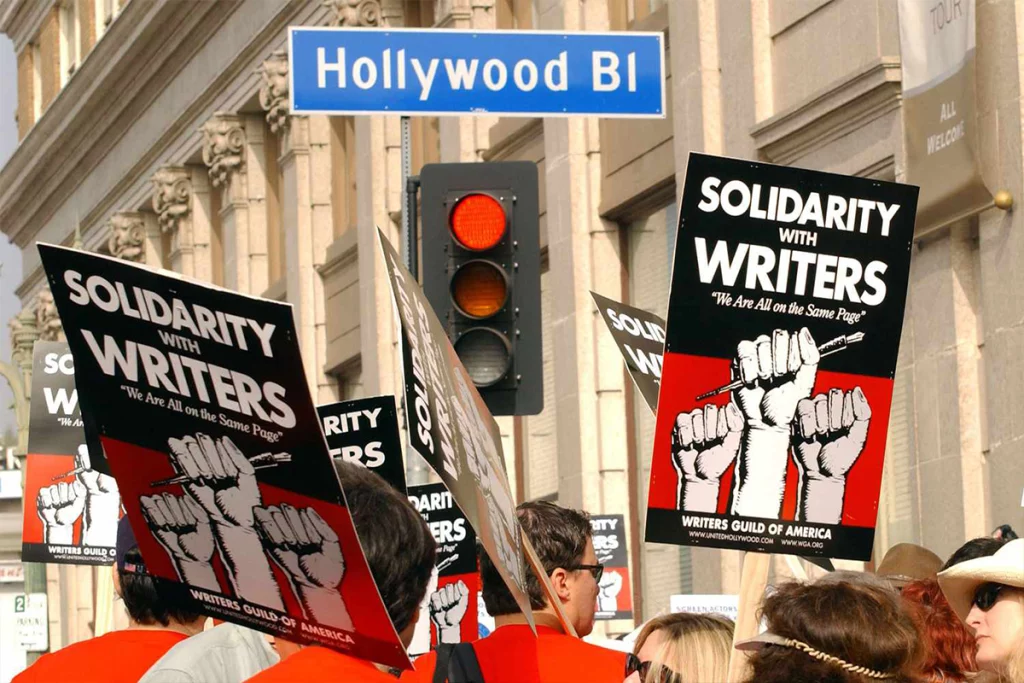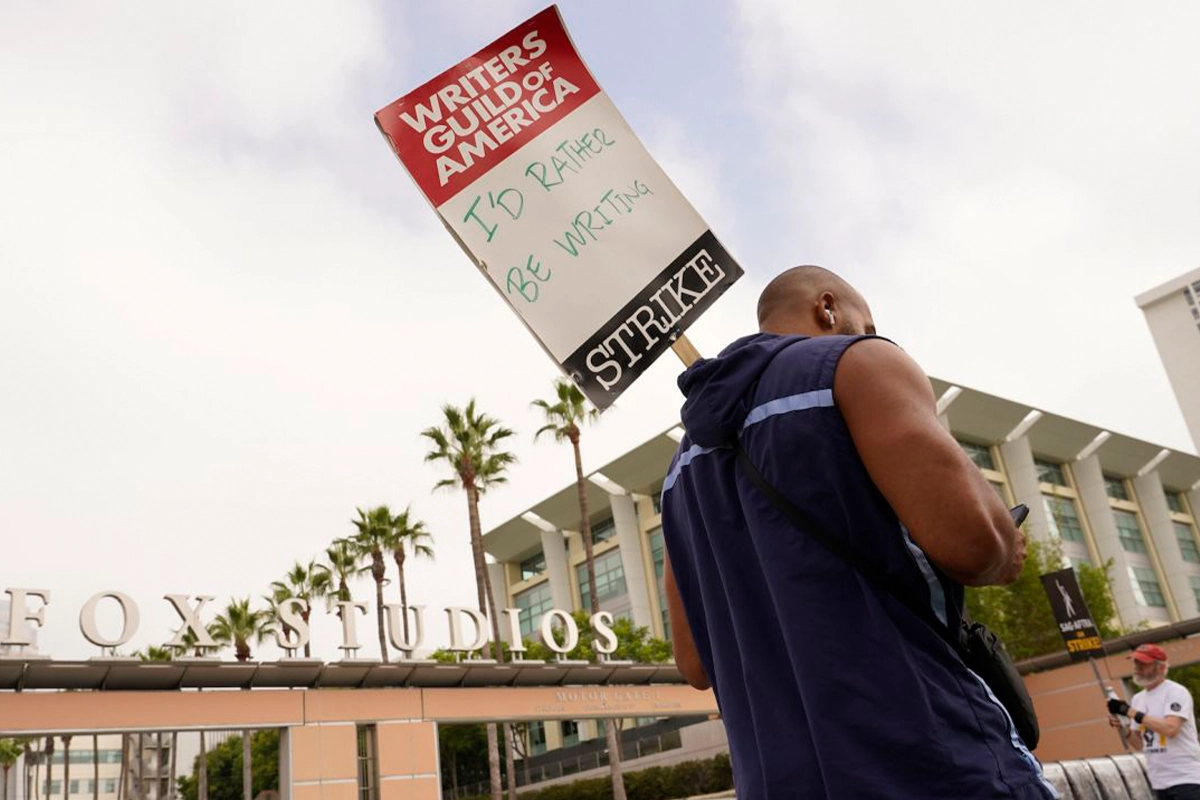As a result of the strikes causing the shutdown of Hollywood productions, arthouse cinema has filled a gap in the film industry changing the dynamics
Is Hollywood facing yet another crisis? The WGA and SAG-AFTRA strikes force a Hollywood shutdown
Currently, the WGA (Writers Guild of America) strike, ongoing since early May, remains unsolved, with both sides accusing each other of intransigence. Adding to the tension, on July 14th, SAG-AFTRA (the Screen Actors Guild) joined the strike, resulting in labor disputes involving both actors and writers that have paralyzed Hollywood. This has led to production halts on a majority of films and television programs. These strikes are also reshaping the landscape of autumn film festivals.
The crisis is halting not just the production — with the actors picketing outside the studios against AI takeover and for a raise in their salaries — but the relationship with the audience as well, which is becoming progressively disaffected to the theater experience. One thing is for certain: since the studios are gradually postponing the releases of major blockbusters, the strikes are succeeding in their aim to shake things up.
The Hollywood crisis – The 80th Venice Film Festival: shifting the spotlight back to arthouse cinema
This year, the Venice Film Festival, which traditionally kicks off awards season, has found itself in a tricky position. Against all odds, after the news of the delayed release of Luca Guadagnino’s Challengers starring Zendaya, who was originally supposed to be the opening film of the 80th’s edition, the festival’s lineup remained unaffected by the strikes. Non-US films are not bound by the strikes, and certain US producers have negotiated interim agreements, allowing their projects to proceed as planned.
These conditions offer a favorable scenario for independent productions and arthouse cinema. The growing disaffection for nostalgia-driven sequels and superhero franchises, has led the audience to prefer the passive engagement with streaming platform giants whose offer provide a plethora of titles. So apparently, with the US productions out of the equation, the industry has created a hole ready to be filled out.
Hollywood studios absence to create more space for independent productions: A24’s Priscilla, Ferrari acquired by NEON, Memory by MUBI
Hollywood is facing a crisis – not cinema. The strikes have not dampened the enthusiasm for film festivals, as evidenced by the success of the Venice Film Festival. The movies allowed to attend are produced by smaller studios: with actors notably absent and the usual social media buzz about backstage drama missing, it was the auteurs and other members of film production crews who took the spotlight for a change.
Fans lined the red carpet, cheering for directors like David Fincher and Michael Mann, veteran cinematographer Vittorio Storaro received a standing ovation, and makeup artist Kazu Hiro addressed controversy over the use of a prosthetic nose in Maestro. Director Yorgos Lanthimos, who ultimately won the Golden Lion for its bold anti patriarchy tale Poor Things, commented on the lack of sex scenes in modern movies sparking a discourse on the artistic merits of full-frontal nudity in cinema. Some of these films are considered potential Oscar contenders, reaffirming Venice’s status as a launchpad for the awards season. In conclusion, reports of the festival’s demise appear to have been exaggerated.

Human rights in the work field – Actor Adam Driver to question why smaller NEON and STX International could meet SAG’s demands while Netflix and Amazon couldn’t
In the absence of celebrity figures, the prevalent theme rapidly emerged: the steadfast resistance of major studios to acknowledge and fairly compensate actors and creators for their contributions. Members of the competition jury, including directors Damien Chazelle, Martin McDonagh, and Laura Poitras, and actor Jessica Chastain on the red carpet sported T-shirts bearing the message ‘Writers Guild on Strike!’, so it became evident that most of those attending the festival had strong opinions on the matter.
Adam Driver, one of the few celebrities who walked the red carpet to attend the Ferrari’s premiere, criticized some of the industry’s biggest players, questioning why smaller distribution companies like Neon and STX International could meet the demands of SAG but major players like Netflix and Amazon couldn’t. Director Wes Anderson, whose new Roald Dahl adaptation, The Wonderful Story of Henry Sugar, premiered at Venice, expressed his belief that «an equitable deal has got to be reached for anybody to go forward» since «people are suffering».
The Barbenheimer effect: people don’t watch movies unless dragged by social media marketing
Erik Anderson, editor-in-chief of AwardsWatch, underscores the value of actors promoting their work for visibility in today’s streaming and commercial-free television era. In response to these challenges, two highly anticipated films have decided to change their release schedules. One example is Dune: Part Two, featuring Timothée Chalamet, Zendaya, and Florence Pugh, pushed back from November to March 2024. While the absence of Hollywood studio content at festivals may create opportunities for independent and foreign films, the strikes could have far-reaching consequences for the mainstream US film industry.
The success of visionary films like Barbie and Oppenheimer suggests that investing in talent is a profitable path, challenging the studios’ attempts to leverage the decline of moviegoing in America. The Barbenheimer phenomenon, born from a Twitter meme and rapidly became the Internet sensation of summer 2023, was born from a coined term that forcibly combines the two opposite films, Barbie and Oppenheimer, which were released worldwide on the same day.
The movies couldn’t be more different— Barbie is a loud and tacky comedy starring Margot Robbie as the iconic doll, while the other is a three-hour cerebral drama about the building of the atomic bomb—, yet it created a success of unexpected proportions. Barbenheimer, as explained by sociologists and experts in advertising, highlighted the power of social media marketing: two films, which would normally be competing with each other to gain the public’s attention, were instead brought together by a meme that went viral. As of the time of writing this article, they brought revenues for over 1.4 billion for Barbie and 890 million for Oppenheimer.
Human rights in the work field – towards the Oscar 2024: an unpredictable award season
The work stoppage has resulted in a conspicuous absence of festival stages, and premieres on the red carpet are either much quieter or entirely absent. As a consequence, the landscape of film festivals has undergone a significant transformation, with both organizers and participants directing their efforts towards alternative ways of commemorating the world of cinema.
Virtual gatherings, online film screenings, and live-streamed discussions have now become the prevailing practices, serving as vital tools to sustain enthusiasm and involvement within the film community during these trying circumstances. The industry must persist in adjusting to this ongoing situation and continue to search for innovative methods to promote films and celebrate the art of cinema, even as the path towards a resolution remains uncertain. The Hollywood film industry is the oldest and the largest in terms of revenue: if studios can’t sponsor a film, the industry will face a hard time moving forward.
The Hollywood film industry
Also known as the American film industry, The Hollywood film industry is the world’s oldest and largest film industry in terms of box office gross revenue. It has emerged as the most renowned film industry globally and the largest hub for film production.



















